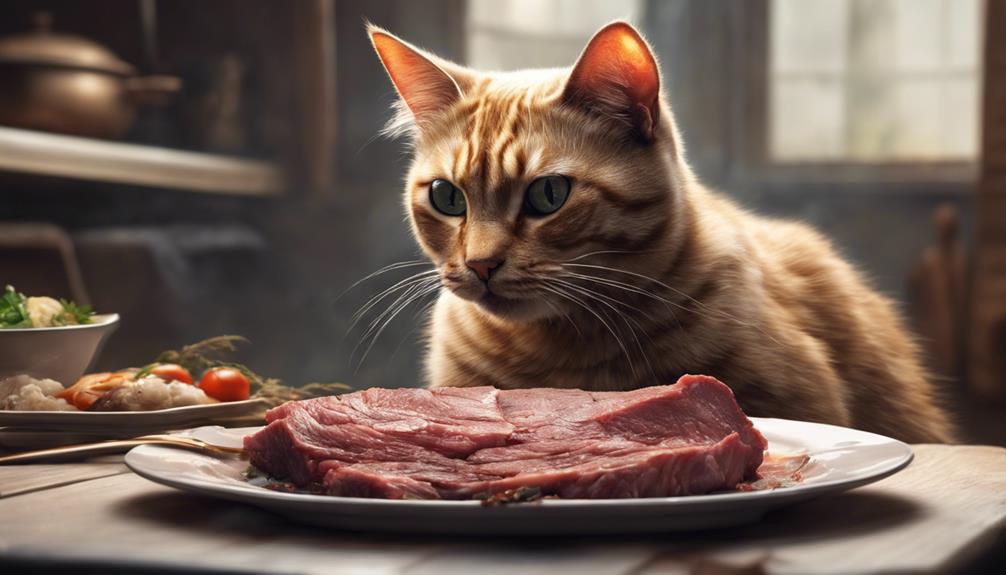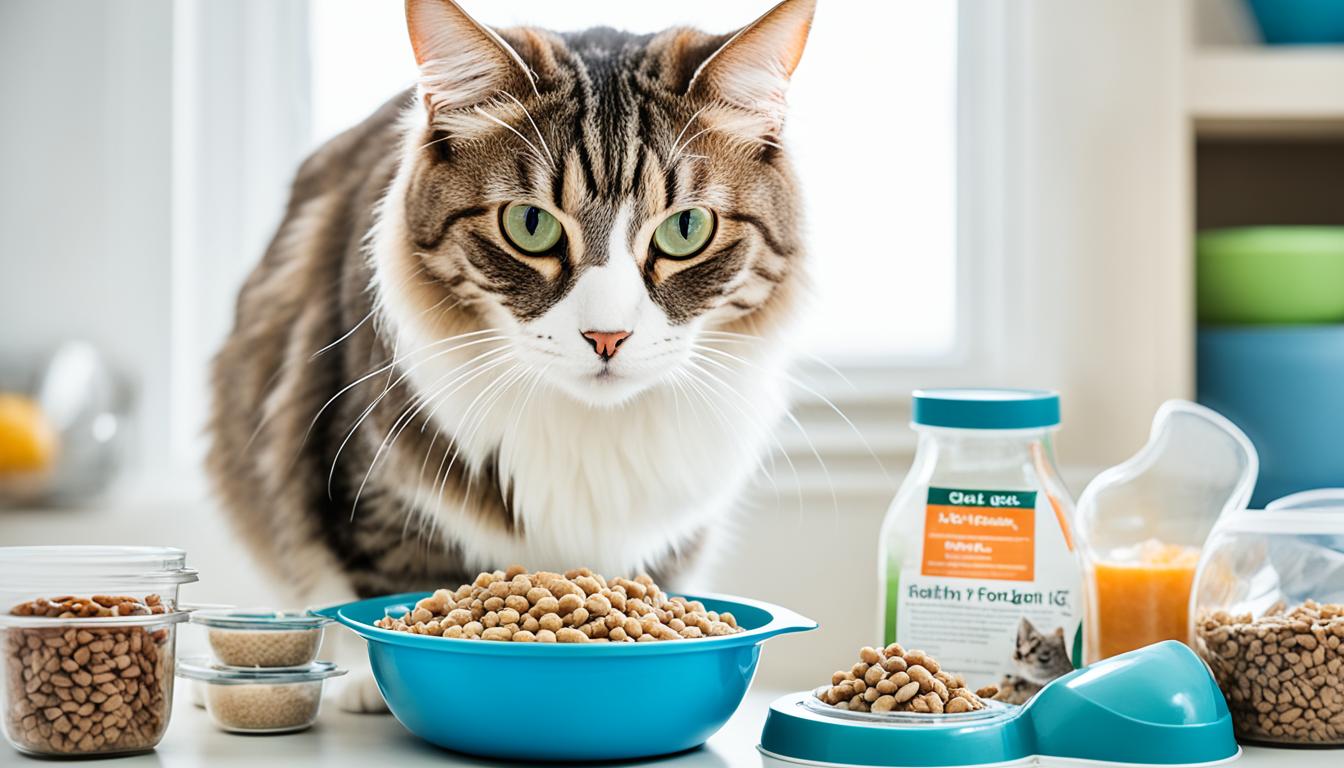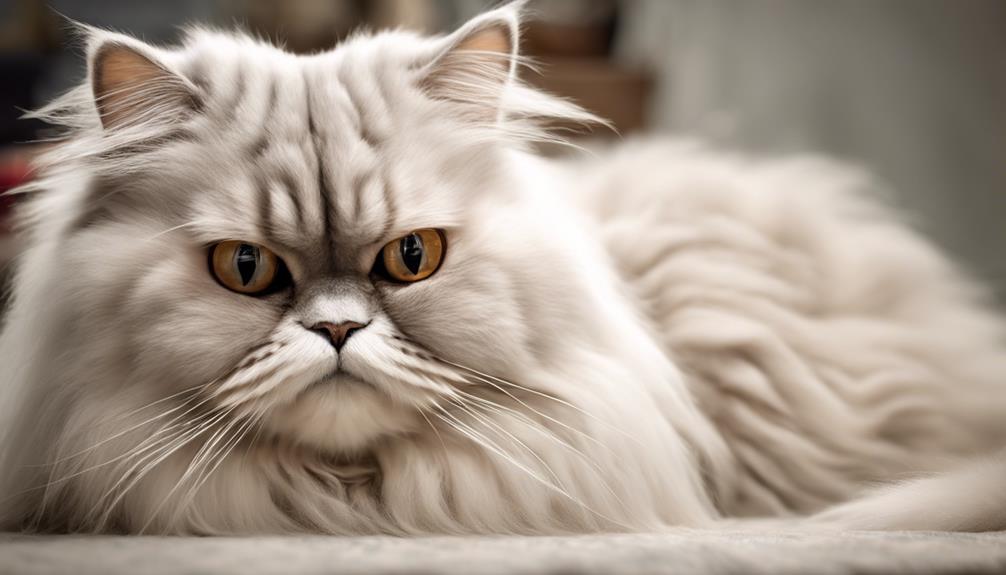Absolutely, cats can safely eat cooked meat. It's a fantastic protein source, benefiting heart health and overall well-being. Remember, cook it thoroughly, skip seasonings, and introduce it gradually. Stick to lean options like beef, chicken, or turkey for a balanced diet. Always remove bones, keep it plain, and serve in moderation. Watch out for harmful additives and high-fat content. Proper storage is key, too. Safely store, refrigerate, and monitor your cat's intake. Cooked meat can be a healthy treat but consult your vet for personalized advice. Keep your furry friend safe and happy with carefully prepared meat!
Key Takeaways
- Offer lean, well-cooked meats like beef, chicken, and turkey in moderation.
- Avoid seasoned or marinated meat and ensure it is boneless.
- Monitor for allergies or sensitivities and consult a vet if needed.
- Store cooked meat properly in airtight containers and follow safe food handling practices.
- Cooked meat should supplement a balanced diet for cats, not be the main component.
Benefits of Cooked Meat for Cats
Cooked meat provides essential protein for the heart health and good vision of cats. As a source of protein, it plays a vital role in maintaining our overall well-being. When we enjoy cooked meat, we aren't just savoring its taste but also benefiting from the nutrients it offers. Our bodies thrive on the protein found in cooked meat, helping us stay strong and healthy. This nutrient is especially important for our heart health and vision, keeping us active and our eyes sharp.
Including cooked meat in our diet can offer a range of benefits. It helps us maintain a balanced diet, ensuring we receive the necessary nutrients for our health. Additionally, cooked meat supports our reproductive system, contributing to our overall well-being. By introducing cooked meat gradually and in its plain form, we can enjoy these benefits without any added risks. As a snack, cooked meat provides us with additional nutrients, making it a wholesome and delicious treat.
Properly Cooked Meat for Cats
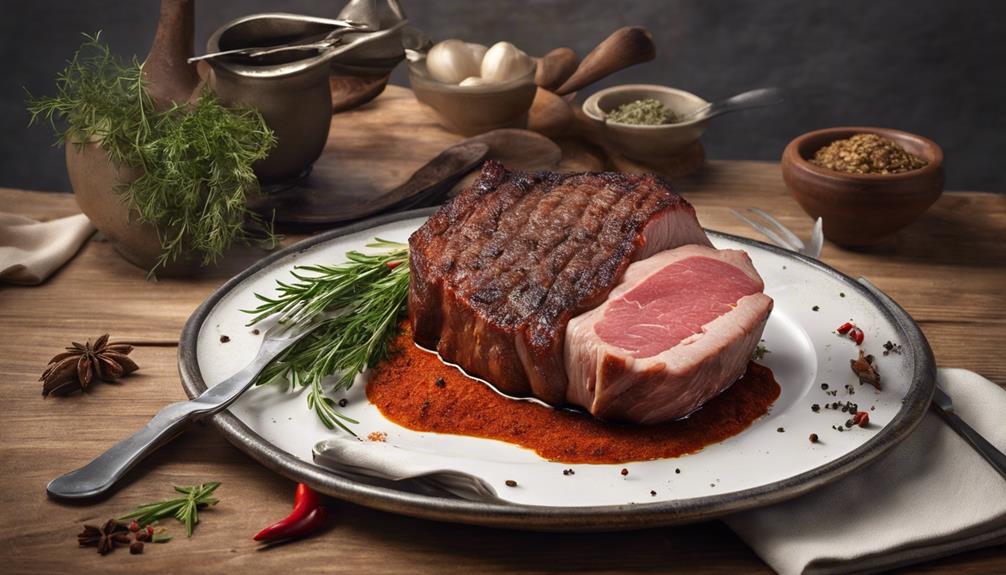
When preparing meat for your feline friend, make sure it's lean and bone-free to avoid any choking hazards. It's crucial to cook the meat thoroughly to eliminate any harmful bacteria that could potentially harm your cat. Here are some tips to guarantee you're providing properly cooked meat for your furry companion:
- Thoroughly Cooked: Guarantee the meat is cooked all the way through to safeguard your cat's health.
- Avoid Seasonings: Steer clear of seasoned or marinated meat, as some ingredients may be toxic to cats.
- Balanced Diet: Cooked meat should only be a small part of your cat's diet, alongside commercial pet food.
- Gradual Introduction: Introduce cooked meat gradually to monitor any adverse reactions or digestive issues.
- Safe Handling: Practice safe food handling procedures to prevent contamination and keep your cat healthy.
Potential Risks of Cooked Meat
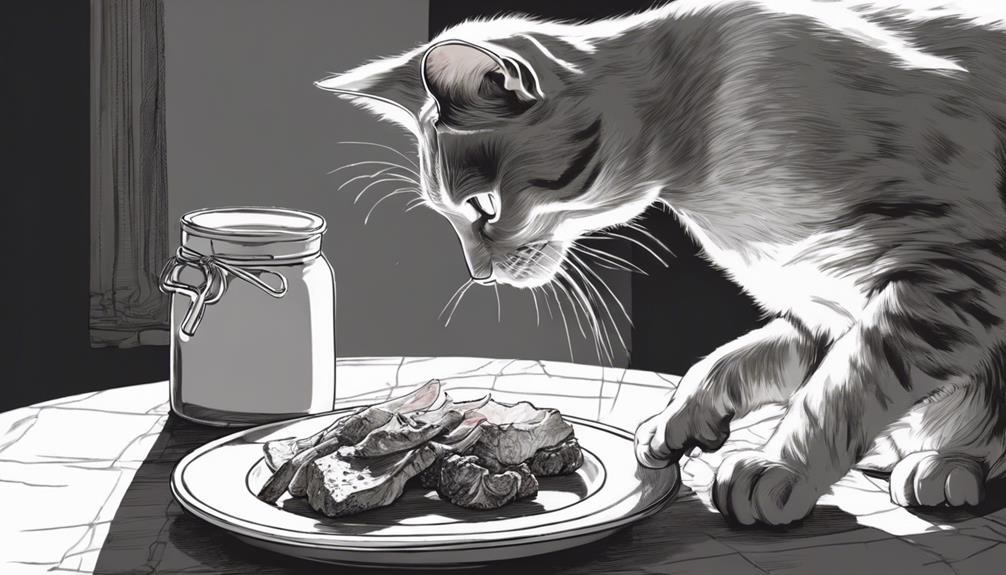
Regularly feeding cats cooked meat can pose various risks to their health and well-being. While cooked meat may seem like a tasty treat for your feline friend, it can actually lead to health issues. Cooked meat can be high in fat, potentially causing obesity and related health problems in cats.
Overconsumption of cooked meat may also result in digestive upset, such as vomiting or diarrhea. Additionally, cooked meat could contain seasonings or additives that are harmful to cats, posing risks of potential toxicity. Certain types of cooked meats, like bacon or sausage, are too high in salt and can be dangerous for cats to consume.
Being mindful of how cooked meat leftovers are stored is important, as improper storage can lead to bacterial growth and increase the risk of food poisoning in cats. Prioritizing your cat's health means being cautious about the cooked meat you offer them to safeguard their well-being.
Choosing Safe Meat Varieties
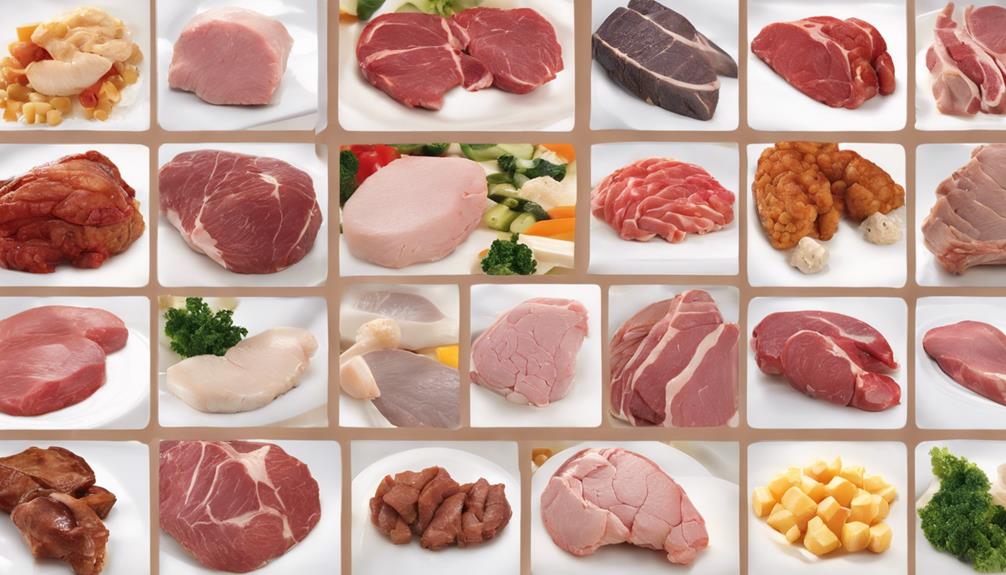
To guarantee the safety and health of your feline companion, opt for lean meats like cooked beef, chicken, turkey, and lamb when selecting meat varieties to feed your cat. Here are some tips to help you choose safe meat varieties for your furry friend:
- Choose lean meats: Select lean cuts of meat to provide your cat with essential proteins without excess fat.
- Ensure thorough cooking: Make certain the meat is cooked completely to eliminate any harmful bacteria that could be present.
- Avoid bones and skin: Remove bones and skin from the meat before feeding it to your cat to prevent choking hazards.
- Opt for high-quality meat: Pick high-quality, human-grade meat to guarantee your cat receives the necessary nutrients for a balanced diet.
- Feed in moderation: Remember that moderation is key when incorporating cooked meat into your cat's diet to maintain a healthy balance.
Cooking Methods for Cat Meat
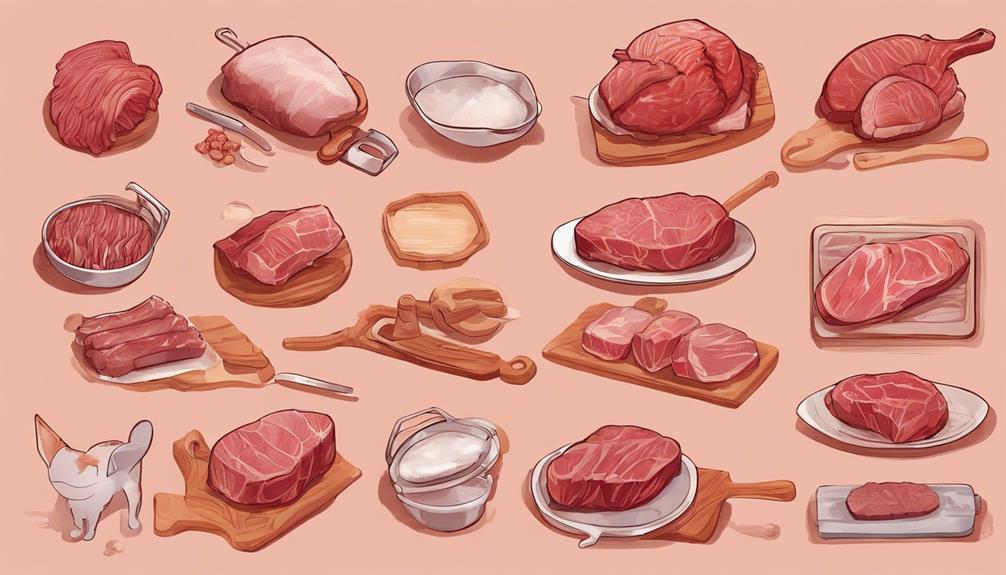
For preparing cat meat, it's important to utilize cooking methods that maintain the meat's safety and nutritional value. When cooking meat for your feline friend, it's essential to avoid using spices, garlic, onions, and excess fat. These ingredients can be harmful to cats.
Make sure the meat is cooked thoroughly to eliminate any harmful bacteria that could make your cat sick. Remove all bones from the cooked meat before offering it to your cat, as bones can pose a choking hazard or cause internal injuries.
Keep the meat plain and free from any sauces or seasonings that may be toxic to cats. Cooking meat separately for your cat ensures that it's safe and suitable for their consumption. By following these guidelines and cooking methods, you can provide your cat with a tasty and safe meal that meets their dietary needs.
Seasoning Concerns for Cat Meat
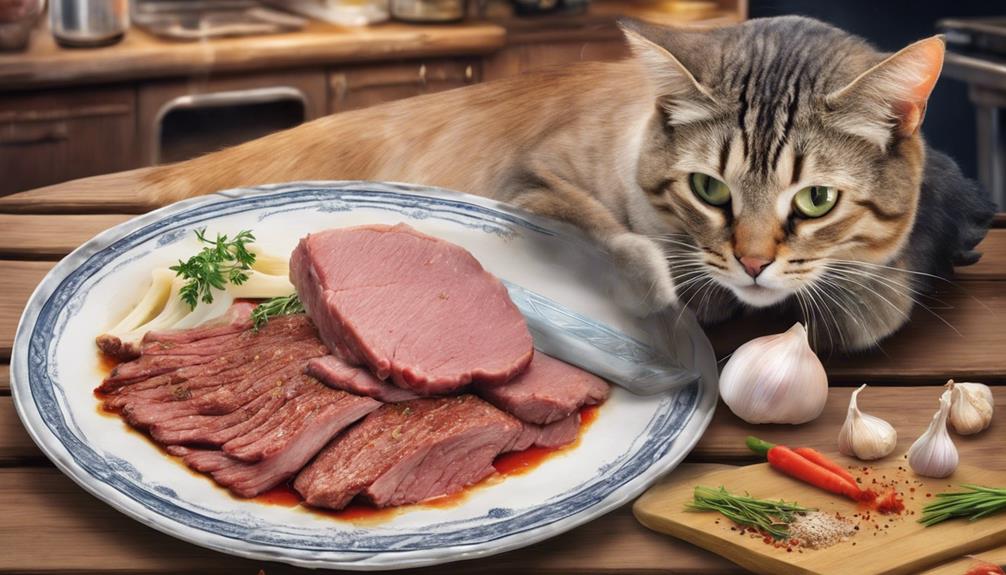
When considering the preparation of cat meat, it's important to be cautious with seasonings, as certain spices like garlic and onion can be harmful to feline health. Cats have more sensitive taste buds than humans, so strong seasonings may not be appealing to them. Here are some seasoning concerns to keep in mind when cooking for your feline friend:
- Toxicity Risk: Seasonings like garlic and onion can be toxic to cats if consumed in large quantities.
- Dehydration Concerns: Excessive salt in seasoned meat can lead to dehydration and kidney issues in cats.
- Digestive Sensitivity: Cats may not tolerate spicy seasonings well and could experience gastrointestinal upset.
- Preference for Plain: It's best to offer plain, unseasoned cooked meat to cats to avoid potential health risks.
- Health First: Prioritize your cat's health by avoiding using seasonings that could be harmful to them.
Optimal Meat Portion Sizes
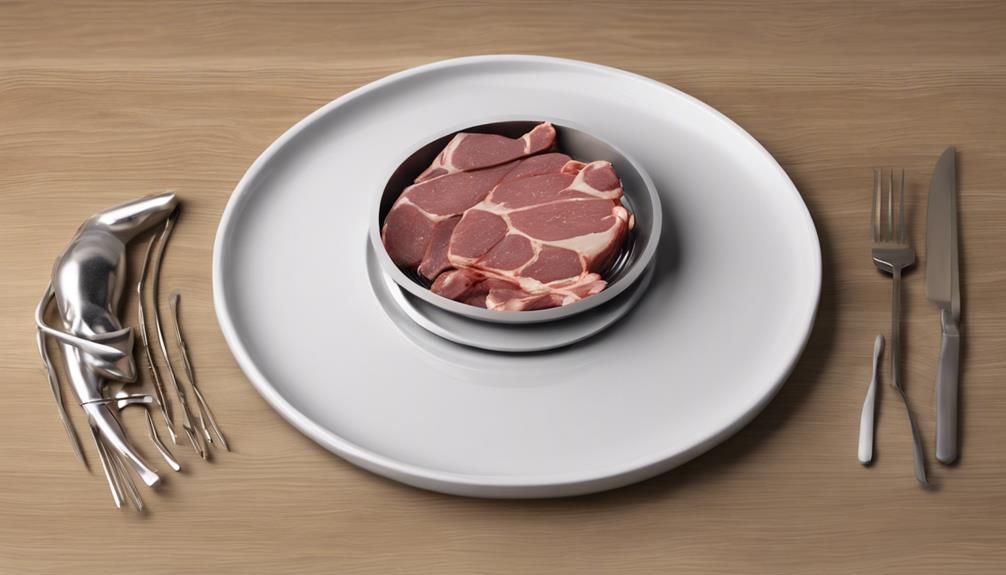
When it comes to feeding our feline friends cooked meat, it's essential to contemplate the best portion sizes. Cats typically enjoy around 1-2 tablespoons of cooked meat per meal.
Ensuring moderation in feeding cooked meat helps prevent any nutritional imbalances that may arise.
Safe Meat Portions
What amount of cooked meat should be included in a cat's meal to ensure safe and balanced nutrition? When considering the right quantity of cooked meat to feed your pet, it's important to maintain a balance for their overall health and well-being. Here are some key points to keep in mind:
- Best portion size is around 1-2 tablespoons per meal, depending on your cat's size and dietary needs.
- Balance cooked meat with other necessary nutrients in your cat's diet to prevent deficiencies or excesses.
- Moderation is vital to avoid potential issues like obesity and health problems.
- Cats may enjoy various cooked meats such as chicken, turkey, and beef, as long as they're fully cooked and bone-free.
- Consult your veterinarian to determine the appropriate portion size of cooked meat tailored to your cat's specific health and dietary requirements.
Cats Meat Preferences
Cats generally prefer small portions of cooked lean meats such as beef, chicken, turkey, liver, and lamb as part of a balanced diet. Best meat portion sizes for cats should be boneless, properly cooked, and served in moderation to prevent health issues.
It's crucial to guarantee that the meat is fully cooked, without any skin or bones, and free from spices or seasonings when feeding your cat. Meats like beef, turkey, and chicken offer essential nutrients for your cat's health and should be introduced gradually into their diet.
Providing a variety of cooked meats can cater to your cat's preferences while ensuring they get the necessary protein and nutrients. Remember, moderation and variety are key when it comes to your cat's meat preferences.
Feeding Cooked Meat
For cats, incorporating cooked lean meats like beef, turkey, and chicken in small portions can enhance their balanced diet with essential nutrients. When feeding cooked meat to cats, it's important to follow these guidelines:
- Cats can safely eat cooked lean meats like beef, turkey, and chicken in moderation.
- Make sure the cooked meat is boneless, well-cooked, and free from seasonings or sauces.
- Cooked meat shouldn't be the main component of a cat's diet but can be a healthy snack or occasional treat.
- Moderation is key to prevent digestive issues or nutritional imbalances.
- Introduce cooked meat gradually to monitor for any adverse reactions or sensitivities.
Feeding Frequency of Cat Meat
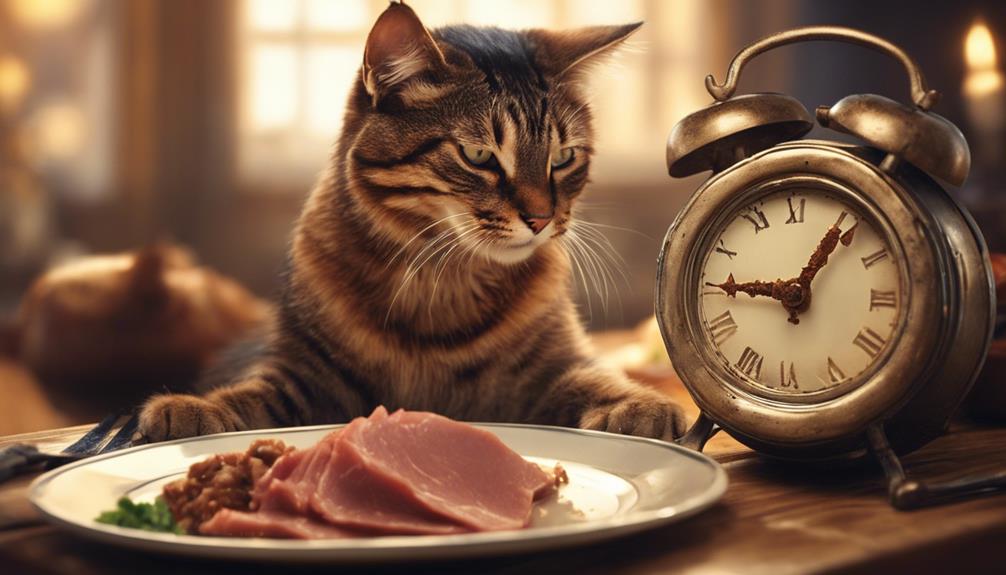
When incorporating cooked meat into a cat's diet, it's important to think about the best feeding frequency. While cooked meat is safe for cats to consume, it's essential to remember that moderation is key in their diet.
We should view cooked meat as a special treat or supplement to their regular cat food, rather than the main component. Introducing new proteins gradually allows us to monitor any potential allergic reactions or digestive issues that may arise.
Remember to keep the cooked meat plain, free from sauces, seasonings, or excessive fats to guarantee it's safe for our feline friends. Although cooked meat provides essential nutrients, it should be balanced with other elements of a cat's diet to meet their overall nutritional needs.
Monitoring Cats Meat Intake
To maintain a balanced diet for your feline friend, it's essential to monitor the quantity of cooked meat they consume. Here are some tips for monitoring your cat's meat intake:
- Keep track of the amount of cooked meat you offer to prevent overfeeding and guarantee a well-rounded diet.
- Moderation is key when treating your cat with cooked meat to avoid nutritional imbalances and excessive calorie intake.
- Monitor your cat's weight and overall health when incorporating cooked meat into their diet to make sure they're thriving.
- Consult with your veterinarian to determine the appropriate portion size of cooked meat for your cat based on their individual needs.
- Watch for any signs of digestive issues or allergies when introducing cooked meat to your cat's diet, such as vomiting, diarrhea, or skin reactions. It's important to be attentive to any adverse reactions to keep your cat healthy and happy.
Cat Meat Allergies
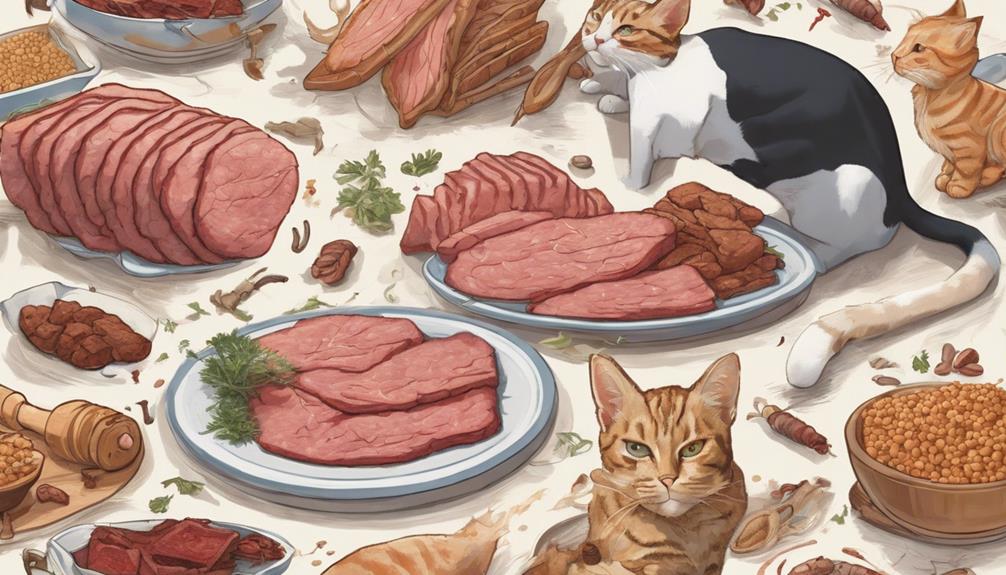
Watching your cat's meat intake is vital for maintaining their well-being, and it becomes even more important when considering potential cat meat allergies. While cat meat allergies are relatively rare, it's essential to be aware of the possibility.
Some cats may develop allergies to certain types of meat, with symptoms ranging from skin rashes and itching to vomiting and diarrhea. Common food allergens for cats include beef, dairy, fish, and chicken. If you notice any signs of a meat allergy in your cat, such as unusual behavior or digestive issues, it's advisable to consult a veterinarian for a proper diagnosis and treatment plan.
Veterinarians may recommend elimination diets to pinpoint the specific meat causing the allergic reaction in your cat. Remember, just like humans, cats can develop allergies to specific foods, so being vigilant and observant of your cat's reactions to different meats is key to ensuring their health and well-being.
Consulting a Veterinarian About Cat Meat
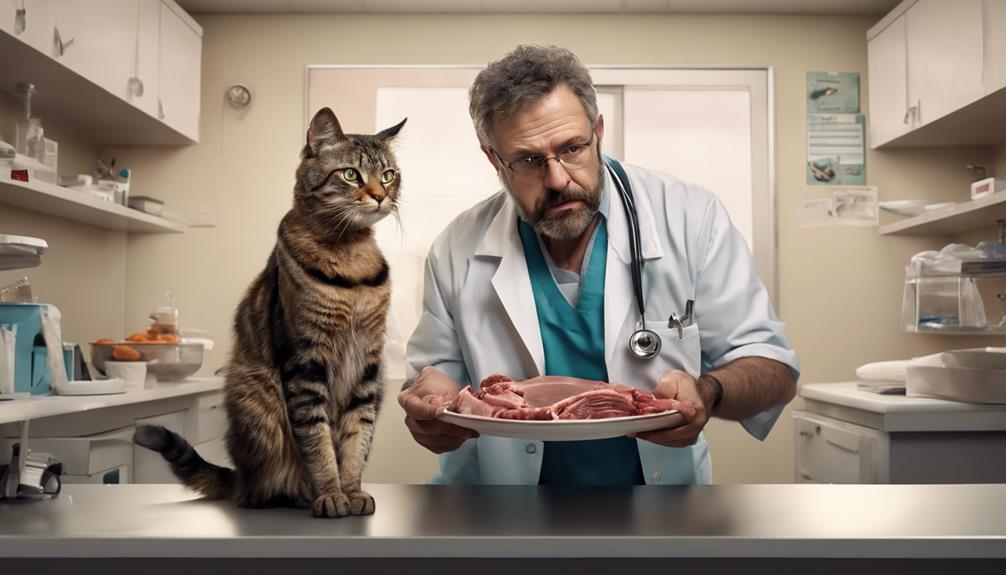
Seeking guidance from a veterinarian is essential when considering incorporating cooked meat into your cat's diet. Veterinarians play a critical role in ensuring your feline friend's health and well-being, especially when it comes to dietary choices. Here are some reasons why consulting a veterinarian is crucial:
- Veterinarians can provide personalized advice on feeding cats cooked meat safely.
- Consulting a vet ensures that the cooked meat meets your cat's specific dietary needs.
- Vets can recommend appropriate portions of cooked meat for your cat's size and health.
- They can advise on any potential allergies or sensitivities your cat may have to certain meats.
- Vets can guide you on how to introduce cooked meat into your cat's diet gradually and monitor their response.
Incorporating Meat Into Cats Diet
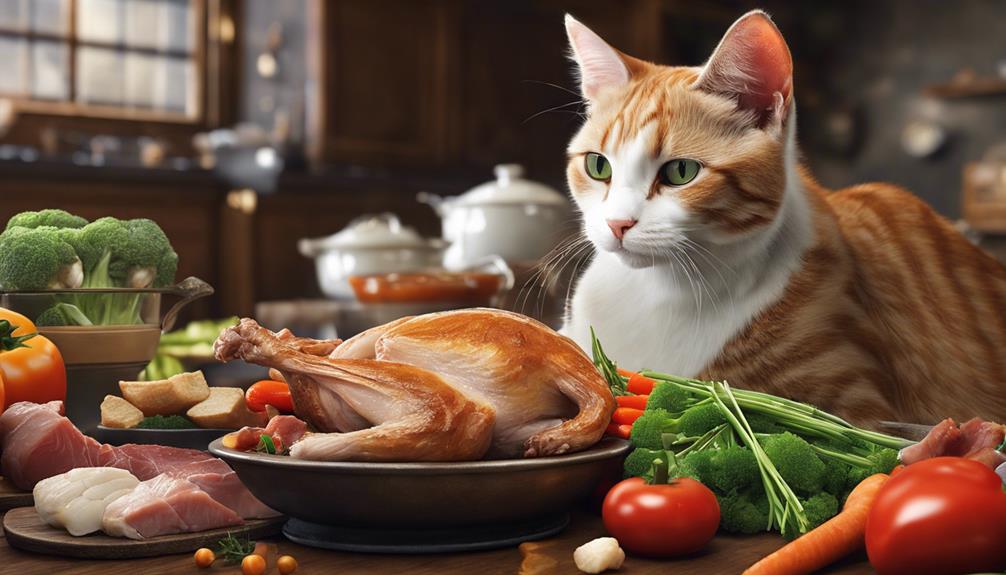
When it comes to incorporating meat into our cats' diet, it's important to prioritize their health by providing essential proteins and nutrients. By offering a variety of cooked meats like beef, turkey, and chicken, we can help fulfill our feline friends' dietary needs.
Ensuring that we remove bones, skin, and excess fat from cooked meat before serving helps prevent any potential choking hazards or digestive problems.
Meat for Cat Health
Incorporating a variety of cooked meats into a cat's diet is crucial for their overall health and well-being. Cooked meat provides essential protein that supports heart health and good vision in cats. When feeding your feline friend, consider cooked beef, chicken, turkey, and lean deli meats for their meat-based diet.
Remember to steer clear of raw or spoiled meat, as it can lead to illness. Introducing meat into your cat's diet can also contribute to maintaining a healthy reproductive system. To guarantee your cat's well-being, gradually introduce new proteins and avoid fatty cooked meats.
Your cat's health is a priority, so make informed choices when selecting their diet.
Protein Needs Met
To ensure peak health for our feline companions, it's essential to understand how including meat in their diet meets their protein requirements. Cats need protein for heart health, good vision, and a healthy reproductive system. Meat, such as cooked beef, chicken, turkey, and lean deli meats, serves as an excellent source of protein for our furry friends.
Not only does meat provide the essential proteins that cats need, but it also acts as a source of vitamins necessary for their overall well-being. It's important to introduce new proteins gradually into their diet to prevent any digestive issues.
While meat shouldn't be the sole component of their diet, incorporating it can be a beneficial addition to their complete and balanced cat food.
Cooking Methods for Safety
For ideal feline health, making sure the complete cooking of meat before feeding it to cats is essential. When incorporating cooked meat into a cat's diet, it's important to cook it thoroughly to eliminate any harmful bacteria that could pose a risk to your furry friend's health.
Here are some practical tips to guarantee the safety of cooked meat for your cat:
- Avoid using seasonings or sauces to prevent digestive issues.
- Remove any bones from cooked meat to prevent choking hazards.
- Introduce cooked meat gradually to monitor for potential allergic reactions.
- Remember that cooked meat should only be a small part of your cat's balanced diet.
- Always prioritize your cat's health by confirming the meat is fully cooked before serving it to them.
Rotating Meat With Other Foods
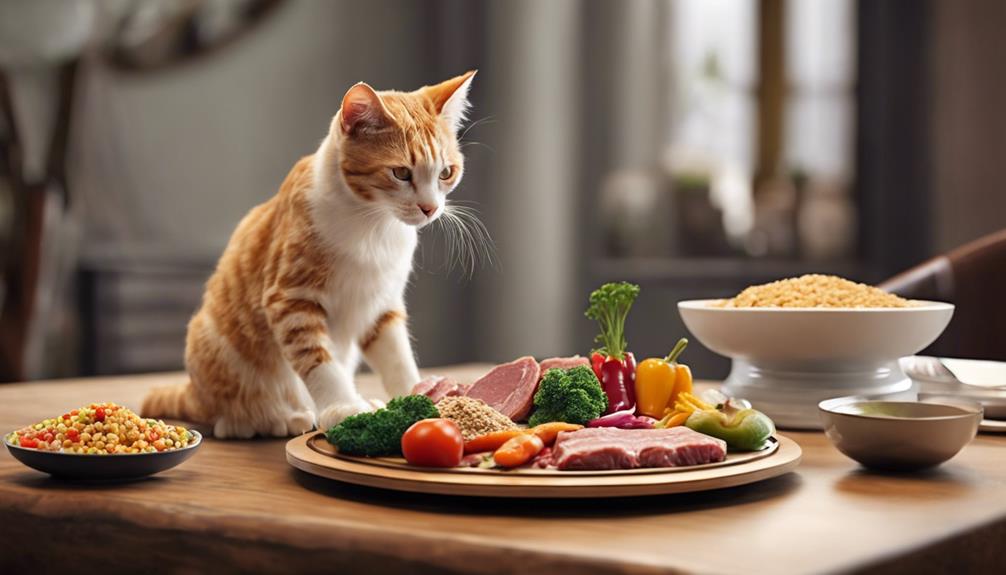
Rotating different meats with other foods guarantees a balanced diet for cats by diversifying their nutrient intake. By offering a mix of raw foods like meats alongside other cat-friendly ingredients, we can make sure our feline friends receive a well-rounded diet. Variety in a cat's diet is key to preventing nutrient deficiencies that may arise from sticking to just one type of meat. Catering to their taste preferences and nutritional needs through a diverse range of proteins can keep mealtime interesting and beneficial for our cats.
Moreover, rotating meats can also help prevent our cats from developing allergies or sensitivities to a specific type of meat over time. Including a variety of meats in their diet can significantly enhance their overall health and well-being by providing essential nutrients they need to thrive. So, next time you prepare your cat's meal, consider mixing it up with different meats and foods to keep their diet exciting and nutritionally robust.
Cat Meat Storage Guidelines
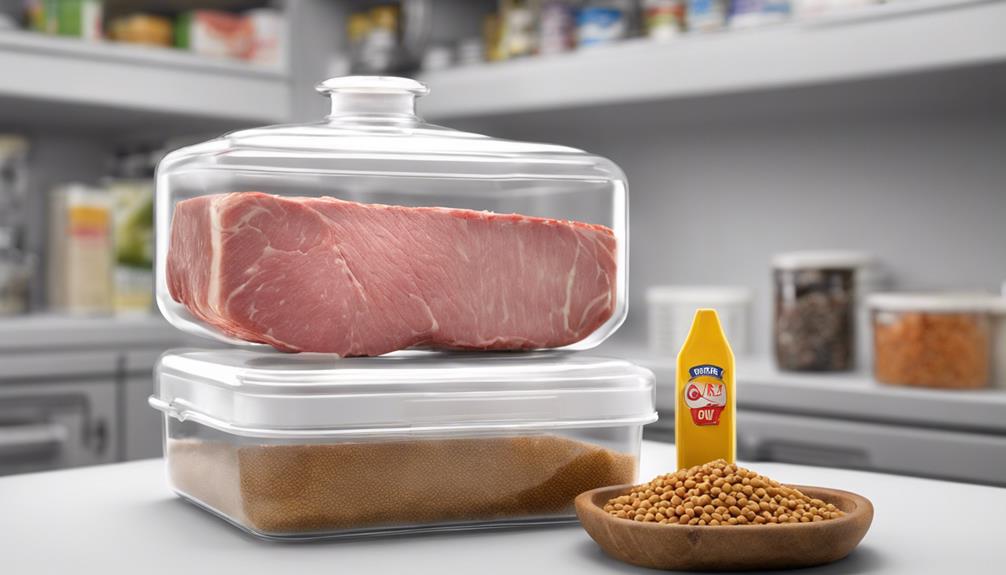
When storing cooked meat for cats, it's important to keep it in airtight containers in the fridge for 3-4 days or freeze it in freezer-safe bags for 2-3 months. Labeling containers with the cooking date helps track freshness, and thawing frozen meat in the fridge or microwave before feeding cats is essential.
Remember to discard any meat left out at room temperature for over 2 hours to prevent bacterial growth and guarantee your feline friend's safety.
Proper Meat Temperature
To guarantee the safety and freshness of cooked meat for cats, it's essential to store it at or below 40°F (4°C) in the refrigerator for up to 3-4 days. Ensuring proper meat temperature is vital for your feline friend's health. Here are some key points to remember:
- Store cooked meat at or below 40°F (4°C) in the refrigerator.
- Use a thermometer to check the temperature regularly.
- If freezing meat, make sure it's stored at 0°F (-18°C) or below.
- Thaw frozen meat in the refrigerator or microwave, not at room temperature.
- Proper storage and handling help maintain the quality and safety of the food for your beloved cat.
Refrigeration Best Practices
For best freshness and safety of cooked meat for cats, storing it in airtight containers in the refrigerator is vital. Keeping the cooked meat chilled helps maintain its quality and prevents harmful bacteria from multiplying.
Remember, leftover cooked meat should be consumed within 3-4 days to make certain it's safe for your feline friend to eat. To avoid any potential cross-contamination and foodborne illnesses, store the cooked meat away from other foods in the refrigerator.
Don't forget to label the containers with the storage date, making it easier to track freshness and making sure you don't feed expired meat to your cat. Proper refrigeration of cooked meat is essential to prevent spoilage and maintain its nutritional value for your beloved pet.
Avoid Cross-Contamination
To maintain the safety and freshness of cooked meat for your cat, storing it in airtight containers in the refrigerator is crucial in preventing cross-contamination. When dealing with human foods, make sure to follow these guidelines:
- Keep raw meat separate from cooked meat to avoid bacterial contamination.
- Use separate cutting boards and utensils for preparing raw and cooked meat for your cat.
- Wash your hands thoroughly after handling raw meat before touching cooked meat for your cat.
- Discard any cooked meat that has been left out at room temperature for more than 2 hours to prevent spoilage.
Following these simple steps will help guarantee that your cat's meals aren't only delicious but also safe to eat.
Conclusion: Cooked Meat and Cat Health
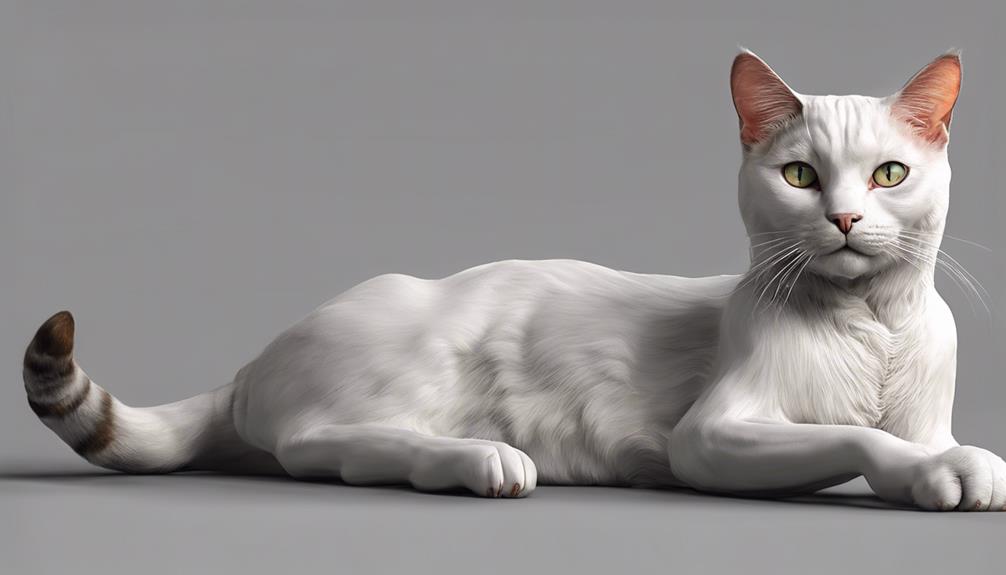
When considering the impact of cooked meat on cat health, it becomes apparent that this protein source plays a significant role in maintaining their overall well-being.
Cooked meat provides essential nutrition, especially protein, which is important for various aspects of a cat's health. From supporting heart health to ensuring good vision and a healthy reproductive system, protein from cooked meat is beneficial.
However, it's important to remember that cooked meat shouldn't be the main source of nutrition for cats. While it can serve as a healthy snack or supplement to their diet, a balanced and tailored meal plan is essential for their overall well-being.
Frequently Asked Questions
What Is the Best Meat to Cook for Cats?
When considering the best meat for cats, opt for lean options like beef, chicken, or turkey for their high protein content. These choices are nutritious and help maintain our feline friends' health and well-being.
What Cooked Food Can I Feed My Cat?
We can feed our cats a variety of cooked foods like lean meats, fish, whole grains, and eggs. It's crucial to make sure all bones are removed and avoid raw meats and fish to keep our feline friends safe and healthy.
What Human Foods Are Safe for Cats?
Oh, let's dig into what human foods are safe for our feline friends! Cooked meats like beef, turkey, and chicken, de-boned fish, whole grains, and a sprinkle of cooked eggs can make purrfect treats.
Can Cats Eat Scrambled Eggs?
Absolutely, cats can enjoy scrambled eggs as a safe and nutritious treat. Make sure they are thoroughly cooked and free from seasonings like salt, onion, or garlic. Introduce them gradually to guarantee your cat tolerates them well.
Conclusion
To sum up, cooked meat can be a beneficial addition to a cat's diet when prepared properly. By following safe cooking methods and selecting appropriate meat varieties, you can provide your feline friend with a tasty and nutritious treat.
Remember to rotate meat with other foods to guarantee a balanced diet, and always store meat properly to maintain freshness and quality. Your cat's health and well-being will thank you for it!
